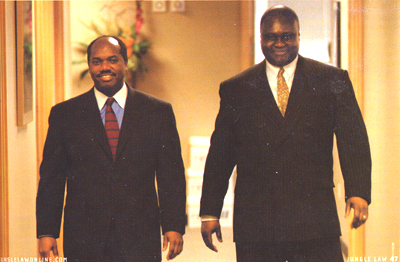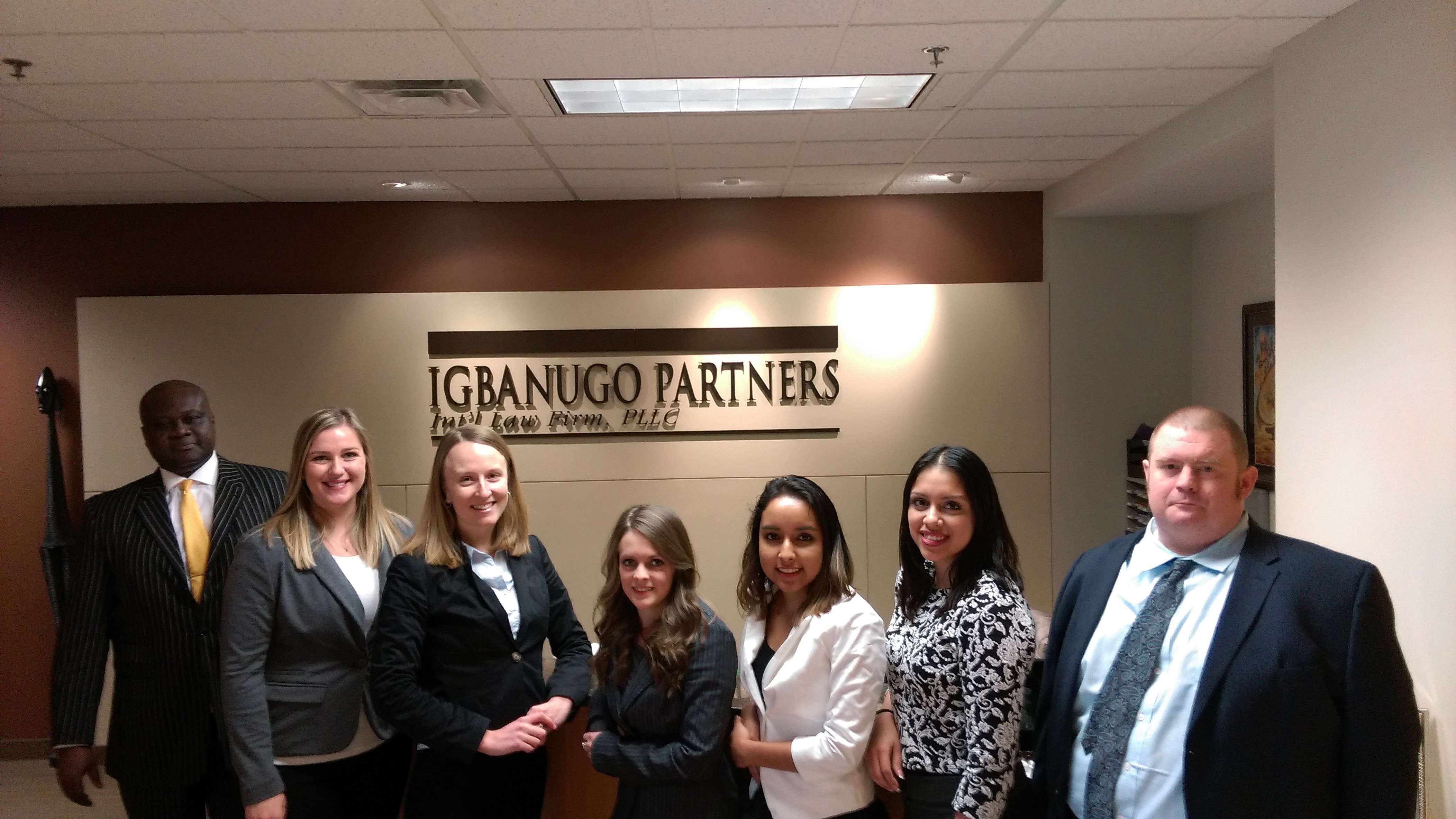Junglelaw.com – March/April, 2004
By Farley Urmston

MEN IN BLACK Jerry Blackwell, left, and Herbert Igbanugo at their firm’s headquarters.
Too many hiring partners spend too much time wringing their hands and staring out their windows, waiting for the secrets of diversity to appear before them. They rationalize, convincing themselves that there aren’t enough minority candidates. They give up, wondering why minority law school graduates didn’t line up at the door. What they should be doing, of course, is conducting mock trials of Jack and the Beanstalk with high school kids.
That’s what lawyers at the Minneapolis firm Blackwell Igbanugo will be doing soon. The charges? Trespassing, burglary, and second-degree murder. The participants: underprivileged high school students from throughout the Twin Cities area.
It’s a nice gesture, giving back to the community. But for Blackwell Igbanugo, the second largest black-owned law firm in the country with 23 lawyers, the mock trials also will serve as a sort of abstract recruiting device. “We want to make being a lawyer something that is relevant and possible for these kids,” says Jerry Blackwell, president and cofounder of the firm, whose clients include 3M and Lockheed Martin. In that way, the activity is a reflection of the nationwide effort by private firms to increase their ranks of minorities — it’s a good thing to do, and it’s good for business because clients demand it. “If you are excluding any group of people based on an immutable characteristic, you are losing out on an opportunity to offer something very valuable to clients,” says Blackwell. “I want to be able to be competitive in any part of the country –before any jury — and to be able to offer that to our clients.”
Still, the hand-wringing firms ask: How, exactly, do you avoid the exclusion to which Blackwell alludes? You invent. Maybe you start a mock-trial program at an inner-city school. Maybe you establish a group that exists to serve your and other firms’ needs — call it something like the Twin Cities Committee on Minority Lawyers in Large Law Firms, as Blackwell did (he also helped found the Minnesota Association of Black Lawyers). And maybe you work to assist black judges in reelection campaigns, as Blackwell Igbanugo does.
If community involvement is a long-term solution, recruiting has an immediate impact. Minority candidates may not be as abundant as whites — that’s why they’re called minorities — but Blackwell and his cofounder, Herbert Igbanugo, don’t buy the argument that good minority candidates are hard to find. “You want from your lawyer the same thing you want from your plumber — you want your problem fixed,” says Blackwell. “The fact of the matter is there are plenty of people of color and women who can fix the plumbing but who are denied the opportunity. This is why I have an issue.”
Igbanugo, meanwhile, emigrated to the United States from Nigeria in 1980 and graduated from law school in 1987. He soon became frustrated by what he saw as discriminatory hiring practices. “Back then it was much more difficult,” he says. “Diversity was only paid lip service around here. Someone had to start asking questions: Why are minorities graduating from these [Minnesota law] schools and not being hired?”
Today, the genuine desire by most firms to hire non-whites has created a competitive market, and firms are figuring out how to make themselves attractive to a coveted pool of candidates. Perception is as important as reality. “We come in to interviews in teams,” says Igbanugo. “So a student will most likely see one black, one white, one Asian. We try hard to make it a multicultural interview. If there’s a white person being interviewed, there’s a black person there, too.”
The firm eschews anything so crass as a quota, favoring a more common-sense approach: You see a hole in your team, you try to fill it. “If I am looking at five qualified candidates of five different races, I’ll choose the person that we don’t have in the firm,” says Igbanugo. Recently he was focused on hiring a candidate of Middle Eastern descent. “I think we’ll have him here,” Igbanugo says.
Of the firm’s 23 lawyers (they started with five), nine are women and 10 are minorities-seven black, one Hispanic, and two Asian-American. Two new associates joining the firm later this year (as well as three of four summers) are minorities. Three of the four partners are people of color. Sure, the fact that both founding partners are African-American helps attract and sustain these kinds of numbers, but that alone doesn’t buy diversity. “That we are a black-owned firm does not necessarily give us an edge over other firms in the recruiting process,” says Igbanugo. “One thing we can offer, though, is a comfort zone. People who come here know that they will not have to watch their backs.”
The two partners routinely call on their experiences at other firms to help them run their own-Blackwell was the first African American to start as a first-year and make partner at the large Minneapolis firm Robins, Kaplan, Miller & Ciresi, while Igbanugo worked for an all-black firm in Minneapolis. When they started Blackwell Igbanugo in 2000, the goal was clear: “I wanted to be at a firm where a diversity committee was just not necessary,” says Blackwell. “It has got to be a leadership issue: The leadership says this is important and we are not going to pass go until we address it.”
Whether that leadership is trying to bolster its conscience or its client list, creativity is key. Are Jack-and-the-Beanstalk trials frivolous? Not if they help produce a new generation of minority lawyers. A successful diversity initiative doesn’t just bring color, it brings new ideas and higher quality. Racial diversity is essential, but not for its own sake-it alone does not elevate a firm to greatness. Says Blackwell, “The clients may hire you in part because of your diversity, but they’re not going to keep you because of it.”


